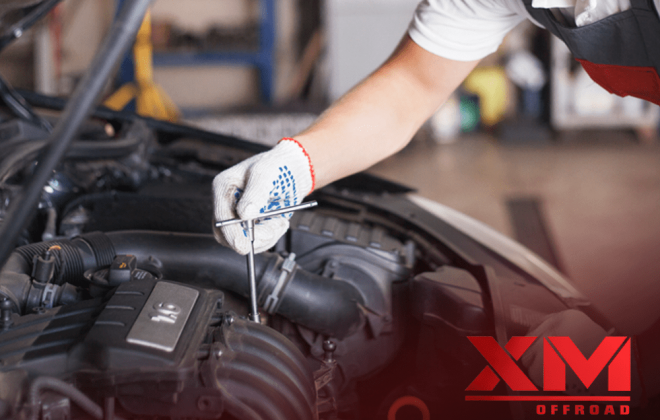Any vehicle requires special attention and upkeep. Knowing how to maintain and preserve these engines in excellent shape, whether gasoline or diesel engines, assures their lifespan. Remember that the maintenance techniques for diesel engines and gasoline engines are not the same. Some are similar, but in most situations, they are not. It is also determined by how you utilize your cars. Diesel vehicles are frequently subjected to more arduous conditions. This is because they are capable of many duties, including pulling, pushing, and transporting large items. If you operate your diesel vehicle in this manner, you must pay special attention to diesel engine maintenance to remain in good shape.
Here are the 9 crucial tips from off-road wheels companies in the USA.
1) Change Engine Oil
When was the last time you changed engine oil? We would recommend you to change the engine oil at regular intervals.
This is the bare minimum you can accomplish. All moving parts are adequately lubricated by the engine oil, resulting in minimum wear and tear. It also retains dust, filth, and sediments, preventing them out of areas they shouldn’t be. Check oil levels once a month and refill if necessary. The manufacturer’s guidelines for oil grade and replacement intervals apply. The oil filter is crucial as it filters all of the trash out of the oil and prevents regulation from being reintroduced into the engine. However this is how your engine will run smoothly and will stay cool.
2) Let Your Engine Breathe Properly
Are you out of breath? Do you get a weary feeling? Well, your car requires oxygen to survive just like you. A restricted airflow might cause the gasoline to not entirely burn, raising pollutants and lowering mileage. Inspect the air filter and, clean and replace them if too much dust and debris clinging to it. Your engine must be able to breathe correctly to work correctly and continue to run.
3) Check Out the Leaks
When you pull out of the garage, check the car park for any spills on the ground. If the fuel is spilling, you must take it to a specialist and get it examined. You may also look beneath the hood to see if anything is leaking. When looking for leaks, check for fluids such as engine oil and antifreeze.
Read Also: 11 Tips To Boost Your Vehicle’s Fuel Mileage
4) Examine Your Belts
Rubber belts are critical connections in keeping everything in tune whenever an engine is running. If you hear a screech from behind the hood, it’s better to upgrade them. Even if your belts endure a long time, you should inspect them for splits and signs of wear. However, if they break while the engine runs, it can cause severe damage, particularly “expensive engine components”!
5) Upgrade Spark Plugs and Wires
The spark plug ignites the air-fuel combination in the cylinders and requires very little maintenance due to its extended life. If you opt for regular maintenance you car’s engine will last longer. Cleaning may be beneficial because a lot of soot accumulates around the electrode over time.
6) Look after Your Engine’s Radiator
The radiator in your vehicle is what keeps it cool. It accomplishes this by passing coolant through the engine to absorb heat. Once heated, the cool air flowing into the front grill cools it down in the radiator.
The substantially cooled air is then returned to the engine, and the cycle is repeated.
Diesel engines generate more heat than gasoline ones. This implies that the radiator of a diesel engine will be subjected to higher temperatures, making it more prone to overheating. As a result, deformed components and engine failure are possible.
It is critical to maintaining your cooling system. This entails running cleaning fluid throughout your cooling system and radiator, as well as replacing the antifreeze in your system. We would recommend you to get this done 50,000 to 60,000 miles.
If you see orange or green fluids pouring from your car, you should have your radiator serviced as soon as possible.
Read Also: Car Cleaning Guide 101: How to Safely Sanitize Your Vehicle
7) Examine Your Air Filter
A clogged air filter might cause your engine to ‘choke.’ This leads it to use more gasoline to generate the necessary power to accelerate. First, examine the condition of your air filter.
On most cars, the air filter is located underneath the hood in a square cold air collector box near the front of the engine compartment.
As a general rule, you need to get this replaced every 12,000 miles.
If you observe a decrease in engine power, a rise in engine wear, or bad acceleration, it is possible that your air filter needs to be replaced.
8) Get in the Maintenance Habit
You must develop the habit of maintaining diesel engines. Begin with weekly inspections to verify your fuel levels are right and pay attention to your mileage for less regular checks. If you maintain your diesel engine properly, it will endure for a very long period.
9) Extra Care and Maintenance in winters
Above tips are critical for ensuring an ideal engine that is not prone to constant damage. However, when it comes to winter, you must take extra precautions. To begin, fill up the tank every time you go to the gas station. It is also critical that you do not keep your car out in the cold for an extended period, especially if the tank is low on fuel. Also, before winter sets in, change your filter and do an engine inspection.
Author Bio
Angie writes content for action movies, custom wheels, safe online casinos, and the automobile industry. She is an avid reader. Angie loves to learn more about car and wheels trends. However, her writing inspires many of her clients.
